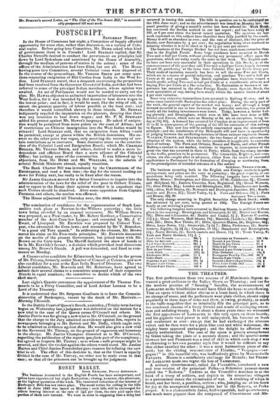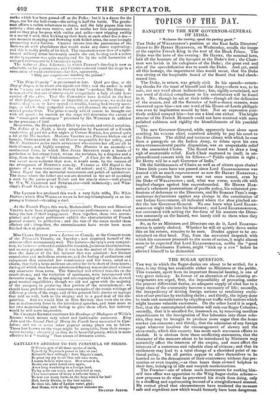THE THEATRES.
THE first performance these two seasons of Ii Matrimonio Segrito at- tracted a good audience to the Italian Opera on Thursday ; and buffer the modern practice of " farming " benefits, the announcement if LABLACHE as the benefieiaire would have filled the house to overflowing. That an opera without either chorus or a brass band, in which there- no change of scene, and the performers wear plain clothes, should enjoy popularity in these days of noise and show, is owing, probably, as muelt to the buffo maguifico that so inimitably fills the principal part, as to the combined charms of a lively libretto and music of uncloying sweet- ness and unfading beauty. It is about a dozen years since we witnessed the first appearance of LABLACHE in this very opera on these boards; and his gigantic vocal power is still unimpaired, his humour as fresh and exuberant as ever : except that he had exchanged the crimson velvet suit he then wore for a plain blue coat and white waisteoast, the mighty basso appeared unchanged ; and the delight he afforded was equally undiminished. The cast of the opera is greatly strengthened by GRIER takiug the place of a seconds donna; and the quarrel-scene between her and FERSIANI was a trial of skill in which each sink,- was so charming in her own peculiar style that it would be difficult to say that either excelled the other : it was a most harmonious piece of tdis- cord ; but the chiding remonstrance of Fidalma, " Vergogna—ver- gogna I" in this beautiful trio, was ineffectively given by Mademoiselle FAVANTI. MARIO is a satisfactory exchange for BIMINI; but FEEDS- = LABLACHE made one regret the loss of TAMBURINI.
A military divertissement, called La Vioandiire, introduced a new and true version of the perpetual Polka—a Bohemian peasant-dance called the " Redowa." CERITO as the Vivandiere marches in at the head of a troop of soldiers, and depicts to the assembled villagers in a pantomimic dance the vicissitudes of war. A cracking of whips is heard, and her lover, a postilion, arrives ; who, jumping on. of his boots for joy at the unexpected meeting, joins her in the Redowa, or Polka proper. It is a characteristic dance, half-coquettish, half-quarrelsome; and much more piquant than the compound of Cracovieuue and Ma- znrka which has been passed off as the Polka: but it is a dance for the stage, not for the ball-room—the acting is half the battle. The gentle- man affects a sullen reluctance to dance, and the lady piques him into activity ; then she runs restive, and he sooths her into acquiescence; and so they play bo-peep with smiles and sulks—now tripping swiftly in a merry round, then kicking up their heels at each other dos-a-dos- one moment stamping and frowning with folded arms, the next lovingly pirouetting waltz-fashion. CERITO throws into the pantomime of the Redowa an arch playfulness that would make any dance captivating; and this is really pretty of its kind. The remorseless row-dow of a tight- braced military drum incessantly assails the ear, beating such a tattoo as the ty tnpantun was quite unprepared for by the solid harmonies of stringed instruments in CIMAROSA'S opera. The ballet of Alma followed; in which FERRO T's dancing is now as admirable as his pantomime; and CERITO careered round the stage 'in a succession of rapid evolutions—her feet, apparently, " Only par complaisance touching the ground."



























 Previous page
Previous page